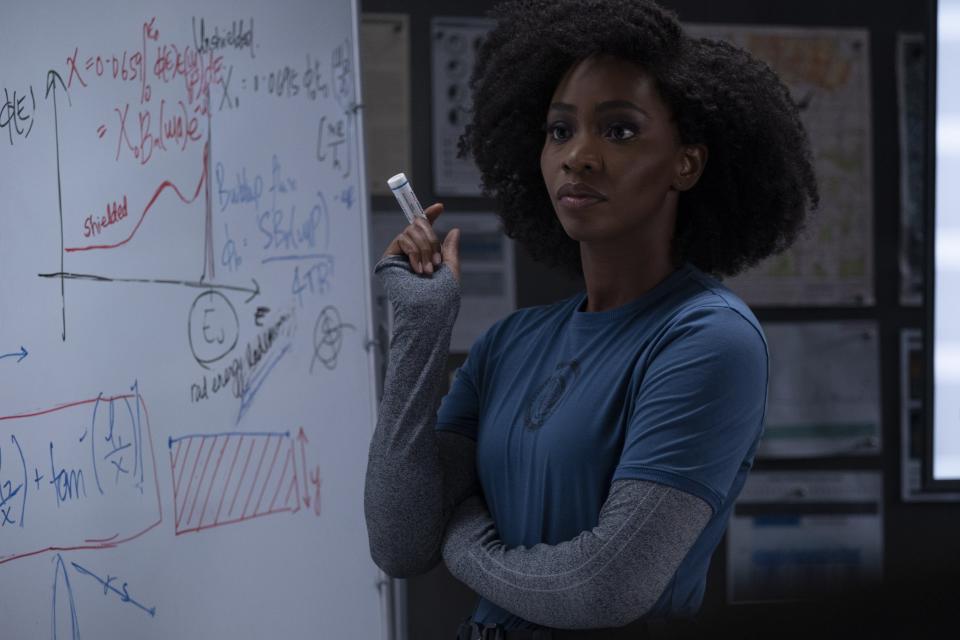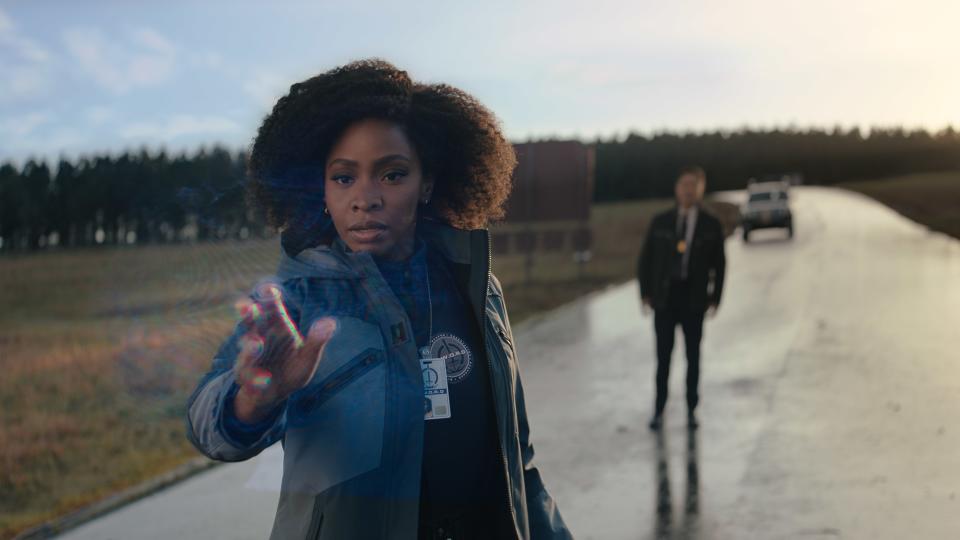WandaVision Star Teyonah Parris Talks About Going to Sitcom Bootcamp
- Oops!Something went wrong.Please try again later.
- Oops!Something went wrong.Please try again later.
WandaVision, Marvel’s first Disney+ series, initially appeared to be a parody or satire of traditional sitcoms: The first two episodes played out in the style of 60s shows like I Love Lucy and Bewitched down to being filmed in black and white, and each episode since has advanced a decade with a corresponding homage: The Brady Bunch for the 70s, Malcolm in the Middle for the aughts, etc. But from episode four onward, the show has become an increasingly meditative story about grief as it turns out that Wanda Maximoff (Elizabeth Olsen) has created this false world in order to come to terms with the death of her lover, the synthetic android named Vision (Paul Bettany).
The show has also begun to fold broader events in the Marvel Cinematic Universe via the character of Monica Rambeau, played by Mad Men and If Beale Street Could Talk actress Teyonah Parris. Rambeau is a beloved Marvel Comics character who first made her MCU appearance as a young girl alongside Brie Larson in Captain Marvel; in WandaVision, she’s now a grown-up government agent for SWORD, currently tasked with de-escalating Wanda’s increasingly harmful alternate reality. We first meet Monica as another captive in Wanda’s fantasy world, but from episode four onward she’s been back in the real world, working to stop Wanda while being sympathetic to her grief. Parris’s kinetic performance helps to anchor both worlds as Wanda’s reality becomes increasingly unstable.
With WandaVision heading into its final stretch, GQ caught up with Parris to talk about the secretive Marvel audition process, going to “sitcom bootcamp,” , and how the show connects with the larger MCU.
What's it been like for you to see fans figure out what’s going on in WandaVision on a week-to-week basis?
Well, at first I was really hoping that [Marvel] would drop all of them, because I wanted to watch them all and I wanted everyone to see all the secrets and everything that was happening so we could talk about it. But I’ve really been enjoying it. We don’t have those week-to-week experiences anymore and I feel like it gives everyone a chance to catch up and see it and have that conversation. Reading all of the theories, seeing the easter egg drops — it gives everyone a chance to get on the same playing field as we move forward.
Marvel can be really secretive about their projects, so when you were in the initial stages of auditioning for the show, what specifics did you know about the role?
I didn’t know much at all. I didn’t know anything about the character. I saw the sides [script pages that are being shot that day] — and I know now they were sides from Episode 3, the 70s [episode]. I was very confused. I was like, “I thought we said this was for Marvel? This doesn’t really make sense.” And it was the speech, or a version of the speech, where I was on the couch talking to Wanda. I’m like, “What am I going on about? I don’t get this.” [laughs] You know what I mean?
But they just said, “Just have fun with it, go with it.” So I went for it and that was that. I did it, sent it off, and literally forgot about it. Because that’s a part of my process — once you do something, just let it go. If it comes back around it will. It was a couple of weeks later, my agent called and was like, “It’s looking good on that Marvel thing” and I was like, “What Marvel thing?” And again, it was sides that didn’t equate Marvel to me.
Did you miss the sitcom elements of the show once Monica got pulled back into the real world? What were some of your favorite sitcoms growing up?
I did the 60s and 70s [episodes], so that was a lot of fun. I didn’t miss the girdles and the nylons of the 60s, but that was based on the wardrobe comfortability level. With the 70s, that was just really fun. The style of acting, I suppose, was challenging because it’s inherently antithetical to what I believe to be truthful acting. The challenge was finding the truthfulness in this style.
Once we got to modern-day Monica, [the acting] is more straightforward. And so there were parts of the sitcom world that I missed, but it was still fun to watch Lizzie [Olsen] and Paul [Bettany] and Kathryn [Hahn] in that sitcom world. It’s a lot of character work and style work that they had to do to accomplish the authenticity in each sitcom decade. So I’ll leave that to them — they’re doing an excellent job with it [laughs].

I watched all sorts, but I Love Lucy was the main one.
You spoke about finding the truth in this sitcom world. Was that difficult to achieve?
Well, we did sitcom bootcamp and we studied the style and structure of each decade of sitcom. So that helped in preparing for each episode, each sitcom tribute. I also did my own research and tried to figure out how I fit into this world, what was going to be the balance of how much modern-day Monica came through as opposed to Wanda’s Geraldine. So that was a dance we had to figure out with myself and [director] Matt [Shakman]. It was a bit of finessing.
What’s the collaboration process in regards to the character when you’re actually filming? When you’re on set, are Kevin Feige [Marvel Studios President] and Jac Schaeffer [WandaVision showrunner] there too?
Oh, there was so much collaboration, day-to-day, in-and-out. To start, just my ideas of who Monica was and is, the research I’d done from reading the comics — making my way through her canon of work, her legacy — and trying to bring some of those aspects of her personality to this, as well as things I mined from Akira [Akbar’s portray of Monica] in Captain Marvel. So there was always this sentiment of collaboration. I always felt heard and it really was just a huge melting pot of ideas.
We’d be on set and I’d say, “Hey Jac, it’s feeling like now that we shot that other scene, maybe this is not exactly what I’m trying to say. Can we tweak it?” And she would jump in there and tweak it. And Mary Livanos, our producer, is such a huge reference point and a huge well of knowledge for all things Marvel Comics and Monica Rambeau as well. So she was a great resource for me.
I know you’ve had experience shooting both TV and movies, so did the WandaVision shoot feel more like a TV or movie production?
It felt like both! We’re truly in both worlds and the creatives were very intentional about being true to the [production] styles we were in. So on sitcom filming days, it felt like a sitcom. Even on that first episode, they did it in front of a live studio audience. Those days it definitely felt true to a sitcom. On the other days when we were in the real world, it felt more like a movie.

Captain Marvel's name has come up a few times in past episodes and, at least in my interpretation, Monica doesn’t seem too jazzed to hear it. Monica and Carol probably won’t interact until Captain Marvel 2, but I’m curious if, when you were acting in WandaVision, you got an idea of future events in order to better inform your acting choices in the present?
Not particularly. Obviously, I know [Monica] is moving on to Captain Marvel 2, so there’s that. At the point of filming [WandaVision], there wasn’t any future specifics that I knew that would inform what I was doing on that day.
I know you probably can’t talk about it too much, but are you excited to work with Nia DaCosta again on Captain Marvel 2 after working with her on Candyman? Can you talk about your experience with her and what you think she'll bring to the MCU?
I’m really excited to join forces with Nia DaCosta again. [Working with her] was such a wonderful process, watching her work. And now that she’s going to be the first black female director in the MCU and her debut will be in a film that I get to participate in is so very exciting. She’s so smart and also very collaborative; I’m really excited to see what we can all create.
A lot of people spent quarantine digging into Mad Men. How do you feel about your time on the show, especially joining the series at a point that it really began to reflect what’s still happening in the world today?
Mad Men was my first time being a recurring [guest] on a show. So that was a huge learning experience for me, just watching Jon Hamm lead that show. He was so kind. It was a quiet show and set for the most part. I just felt like a big pair of eyes, soaking it all in. What’s even crazy is on that show — Matt Shakman, our director — he directed me. So [WandaVision] was this full-circle moment for me.
Originally Appeared on GQ

